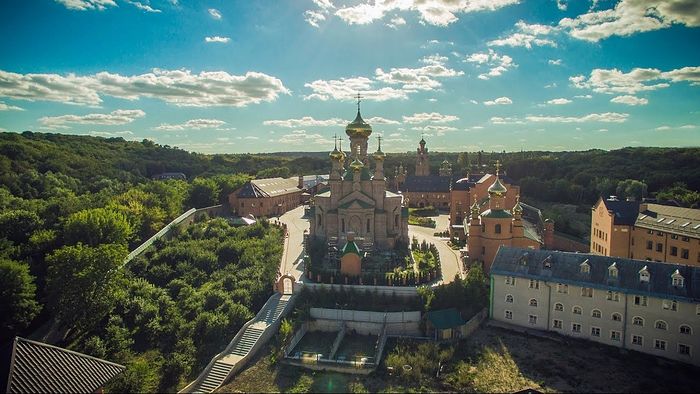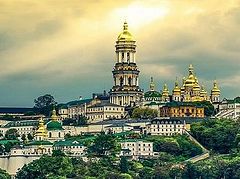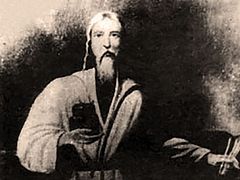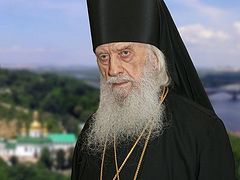Whenever people came to Mother Alypia (Avdeeva; c. 1910-1988) of the Goloseevsky Hermitage [named after the Goloseevsky district in Kiev.—Trans.], a renowned twentieth-century holy eldress, and sought her help, she would tell them first to go to the grave of Hieromonk Alexei (Shepelev). “Go to the cemetery! A saint lies there,” the blessed nun used to say. She knew about the elder’s sainthood back then, though he was canonized five years after her own death.
 Venerable Alexei of Goloseevsky Monastery
Venerable Alexei of Goloseevsky Monastery
“A little monk is coming!”
Several years before Venerable Alexei’s birth his mother, Maria Kuzminichna Shepeleva, knew that her child would be born with disability. She was warned about this beforehand by Archbishop Anthony (Smirnitsky) of Voronezh, who knew her very well. When they were present at the uncovering of the relics of the Holy Hierarch Metrophanes of Voronezh together, the archbishop suddenly said to Maria: “You will give birth to a son with a physical handicap. But do not let it grieve you as he will be a true servant of God.”
A few years later, on Bright Monday April 14/27, 1840, a boy was born in the Shepelev family and was named Vladimir. It turned out that the boy was dumb. But this physical impairment saved Vladimir from military conscription which was then compulsory for all children of noble families, and the Shepelevs family was of the nobility.
When the boy turned three, his father died. His mother Maria Kuzminichna played the main role in his upbringing, above all implanting Christian qualities in her son, namely mercy and godliness. They would often visit the Kitayevo Hermitage in Kiev, which at that time was famous for its holy elder—Schema-Hieromonk Theophil (Gorenkovsky), a fool-for-Christ. One day, seeing Vladimir with his mother in the yard, the elder greeted him with the words: “A little monk is coming! A little monk…” Another time he treated little Vladimir with pryaniks [traditional Russian honey or spicy cakes which are considered to be among the main symbols of Russia.—Trans.], saying: “Now fall on pryaniks! And when you grow up, you will receive Christ.” By these words the elder most probably predicted Vladimir’s future priesthood.
“In Truth He Is Risen!”
When Vladimir reached the age of twelve, he was exempt from attending a military school on account of his dumbness. But his mother was in a very distressed state of mind and dreamed of her son’s healing. She had a strong spiritual bond with Metropolitan Philaret (Amfiteatrov), so she turned to him for help and counsel. The hierarch consoled her and invited them to his house church for the service on Pascha Sunday. When they came up to him to kiss the cross after the service, the metropolitan blessed Vladimir to kiss his palitsa1 as well. After that he said to the boy: “Christ Is Risen!” But the adolescent was silent. Metropolitan Philaret repeated the same greeting twice, and lo and behold, he at last heard the response: “In Truth He Is Risen!” Thus Vladimir was miraculously healed from dumbness.
Obedience in the Lavra
After his miraculous healing young Vladimir joined the Kiev Caves Lavra. He was admitted with the blessing of Metropolitan Philaret on July 2, 1853, at the age of thirteen, and four days later his mother reposed. Thenceforth the metropolitan took it upon himself to take care of Vladimir and the first thing he did was make Vladimir his novice. Another spiritual mentor of Vladimir at that time was Elder Parthenius (Krasnopevtsev), now St. Parthenius of Kiev.
 Holy Hierarch Philaret (Amfiteatrov) of Kiev
Holy Hierarch Philaret (Amfiteatrov) of Kiev
When the adolescent turned seventeen, St. Philaret reposed in the Lord. But before his death he saw to it that Vladimir was given an obedience at the Lavra’s printing house. The printer’s took him on officially on April 15, 1857.
It was then that the time of trials for the young ascetic came. Blessed John (Kovalevsky) “the Barefoot” of Kiev, a fool-for-Christ (now canonized) who frequented the Lavra, once warned Vladimir that he should beware of “womankind”: “They will come for you to the Lavra shortly.” Indeed a month later a noblewoman arrived at the Lavra. She knew the Shepelev family and through other relatives tried to lure the young novice out of the monastery by hook or by crook in order to marry him. It was only thanks to the interference of the father-superior of the Kiev Caves Lavra Archimandrite Varlaam that Vladimir remained in the monastery.
Tonsure and ordination
On April 13, 1872, the Lavra novice was finally tonsured a monk. The tonsure was conducted by the Lavra’s abbot, Archimandrite Varlaam. During the ceremony another significant and providential event happened. It was planned to tonsure Vladimir with the name Philaret, after his patron Metropolitan Philaret. At the very moment when Archimandrite Varlaam was to give the newly-tonsured monk a new name he suddenly forgot the name “Philaret”, and at the same time some mysterious voice suggested that he give him the name “Alexei”, in honor of St. Alexis, the Man of God.
After being tonsured Alexei was temporarily given a new obedience as a record-keeper at St. Nicholas Monastery—the hospital church at the Lavra. On November 23 of the same year he was ordained hierodeacon. And in December 1874, he was assigned to a new obedience as sacristan at the same St. Nicholas Monastery.
On December 6, 1875, Alexei was ordained a hieromonk. It came as a complete surprise not only to Alexei but also to the father-superior himself. The ordination of another hierodeacon was planned on that day, but the night before St. Nicholas the Wonderworker had appeared to Archimandrite Varlaam and told him to ordain Alexei instead. The Church authority heard the Lavra’s father-superior out and ordered to ordain Alexei on that day, what was duly fulfilled.
Soon he was transferred from the St. Nicholas Monastery to the Near Caves, while retaining the same obedience of sacristan. Six years later, for the conscientious performance of his duties Fr. Alexei was awarded a pectoral cross. Right after being ordained a hieromonk he also was entrusted with another obedience—as a father-confessor.
A new tribulation
As Hieromonk Alexei progressed in ascetic labors, evil spirits attacked him ever more fiercely. According to the Life written by an anonymous аuthor, once the devil himself appeared to Fr. Alexei and promised to get even with him because he (Fr. Alexei) kept annoying him by his humility. And indeed soon a great tribulation which took the form of slander and persecution befell the ascetic.
At that time two poor sisters would visit Fr. Alexei in the Lavra. He supported them as far as possible. Thinking that the hieromonk had an enormous fortune, the ungrateful sisters demanded a huge sum of 5,000 rubles of him, claiming that they had earlier allegedly given him this money for keeping. Since Fr. Alexei had never had such an amount of money, he refused them. Then the sisters filed a complaint to his father-superior. Although the father-superior was personally convinced of Fr. Alexei’s innocence, the women got their way and submitted their complaint to a higher instance— the monastery’s ecclesiarch, who was already unfavorably disposed to the venerable man.
The Transfiguration and Goloseevsky Hermitages
First Fr. Alexei was stripped of his post of sacristan. But even this was not enough for the sisters—they started persecuting him and publicly calling him a thief. Wishing to avoid scandals and temptations for people, the Church authority decided to transfer Fr. Alexei to the Holy Transfiguration Hermitage. This took place in April 1891. He spent over four years there and recalled that period with gratitude: “That was the best time in my life. I remembered death there all the time.”
 The Goloseevsky Hermitage. A modern photograph
The Goloseevsky Hermitage. A modern photograph
Finally, on November 15, 1895, Fr. Alexei was assigned an obedience as sacristan to the Holy Protection Goloseevsky Hermitage Monastery, where he spent the rest of his life.
A vision of the Holy Hierarch Theodosius of Chernigov
Hieromonk Alexei’s ability to handle saints’ relics won him fame even outside Kiev. So, when in 1896 the Holy Hierarch Theodosius of Chernigov was canonized and his relics were uncovered, Fr. Alexei was invited to Chernigov as well. And during the re-vesting of his holy relics Fr. Alexei was vouchsafed a vision of the saint himself. The holy hierarch asked him to pray for the repose of his (St. Theodosius’s) parents and told him their names. Astonished, the venerable man argued that he (St. Theodosius) had already been canonized and his prayers were stronger than anybody else’s. But the saint replied that Fr. Alexei must remember them at the proskomidia. “It is higher than my prayers!” the saint added.
The authenticity of that apparition was supported by the fact that the names of St. Theodosius of Chernigov’s parents were unknown at that time. When some years later thanks to the historians’ finds the genealogy of the saint was restored, it turned out that his parents’ names were identical to those given by the holy hierarch to Hieromonk Alexei.
An elder
At Goloseevsky Monastery Fr. Alexei soon got a reputation for being an experienced spiritual father and elder. Not only lay people but also monks and archpastors (including metropolitans) flocked to the humble hieromonk to confess their sins and seek his counsel. Many bishops were Fr. Alexei’s spiritual children. The elder avoided inordinate laudation and humbly turned down all honorary posts and rewards he was offered.
However, Hieromonk Alexei couldn’t avoid two rewards: St. Anne’s Order (III degree), conferred on him in 1905, and a palitsa (awarded by Metropolitan Flavian). At that time Fr. Alexei was the only hieromonk to enjoy this reward because only igumens were granted the right to wear palitsas.
But the most important sign of this recognition was the fact that people who sought his help and advice had confidence in their spiritual father. Despite numerous cases of his clairvoyance, Fr. Alexei never insisted that people obey all his instructions. In many cases people asked him to give them blessings for things that were against God’s will (as was revealed to him). But Fr. Alexei would bless them and let them go with peace; and after that he would pray for these people for a long time and through his prayers they would change their minds. Thus the elder succeeded in avoiding two evils: he didn’t break people’s will and avoided fame at the same time.
The elder’s repose
Fr. Alexei carried out all his labors till the final days of his life and didn’t resort to the help of cell-attendants as long as his health permitted. But his strength was failing: his heart hurt, his feet were swollen and it was hard for him to move around. Due to his infirmity he couldn’t celebrate services anymore and was relieved of this duty, but he continued to receive the faithful.
The venerable man foresaw that his end was near. When in November 1915 he was hearing the last confession of his spiritual son, Metropolitan Flavian of Kiev, His Eminence said to him: “We are parting for a short while and will meet again soon.”
The day before his death the elder gave away his scanty possessions. On March 24 (according to the new calendar), 1917, he was going to serve but began to feel very unwell. He was carried from the church to his cell where he soon fell asleep in the Lord. His end was peaceful and painless.
 The relics of the Venerable Alexei of Goloseevsky Monastery
The relics of the Venerable Alexei of Goloseevsky Monastery
The elder was buried on March 26 at the Goloseevsky Hermitage near the wall of the Church of the icon of “the Life-Giving Spring”. Half a year later a cross-shaped monument was installed at his grave with the following words on its reverse side: “Blessed are the poor in spirit: for theirs is the Kingdom of Heaven” (Mt. 5:3), and further—the words that he used to say again and again: “What am I? A poor monk.”
The uncovering of the relics and the canonization
In 1925, Fr. Alexei appeared to Archbishop Demetrius (Abashidze), the Lavra’s father-superior, in a dream and asked the hierarch to rebury him because he was “floating in the water”. This dream was repeated twice. At his own risk the archbishop resolved to appeal to the secular authorities with the request to rebury Fr. Alexei’s remains and, much to his surprise, obtained a permit, but on condition that if the dream turned out to be an invention he and his accomplices would be punished. Archbishop Demetrius agreed.
As soon as they started digging out Hieromonk Alexei’s grave, people fell into the water in which the saint’s coffin was drifting. The representatives of the authorities were so startled that they scattered instantly, while the faithful gathered around rejoiced. The coffin was reinterred a little lower than the previous site, where the venerable man’s grave survives to this day, much revered by people.
In 1993, St. Alexei’s relics were uncovered and they rest at the church of Goloseevsky Monastery to this day. In 1999, he was finally canonized and locally venerated in the Diocese of Kiev. On November 30, 2017, the name of the Venerable Alexei (Shepelev) was added to the Church-wide calendar of the Russian Orthodox Church.
 Venerable Alexei of Goloseevsky Monastery Instructions of St. Alexei of Goloseevsky Monastery
Venerable Alexei of Goloseevsky Monastery Instructions of St. Alexei of Goloseevsky Monastery
-
It is impossible to walk the path of spiritual life without experiencing temptations, but the Lord will not let us be tempted beyond our abilities;
-
The only way to soothe sorrows is through tears, patience, and prayer;
-
In times of sorrow it is necessary to have patience and show magnanimity;
-
First “we venerate Thy Cross”, and then we “glorify Thy Holy Resurrection”. It is the same in human life—first we suffer, and then we rejoice;
-
Overcome your ego in all situations, and when others revile you and say spiteful things, take it as if the Lord were bringing you to your senses;
-
May His holy will be done in all things—“Thy will be done…”;
-
Help from heaven comes when we can expect it from nowhere else;
-
We should be strict with ourselves and lenient towards others. We are beset by impure thoughts; this will pass—we flow into rage, which is followed by despondency and so on. One thing gives place to another. And all of this is for our humility;
-
Do good as long as your hands are warm;
-
Money is like worms;
-
Distribute your superfluous belongings with your own hands;
-
You should keep fast so that others cannot know that you are fasting;
-
He who doesn’t seek power is not afraid to lose it;
-
Have faith: your soul is cleansed from sins by the grace of God after confession just as having a bath makes your body clean;
-
A Christian must always have Christ in his mind;
-
A physical illness begets humility of the soul, as the apostle said: But though our outward man perish, yet the inward man is renewed day by day (2 Cor. 4:16);
-
Drawing near to God means drawing near to your happiness, while moving away from God means moving away from your happiness;
-
Divine mercy compared to human mercy is like an ocean in comparison with a drop of water.




